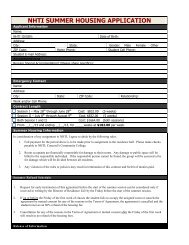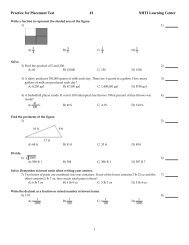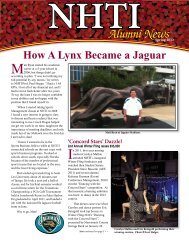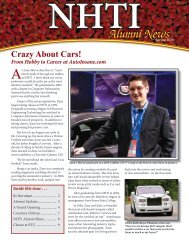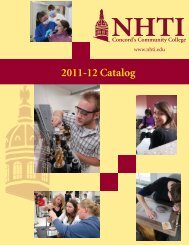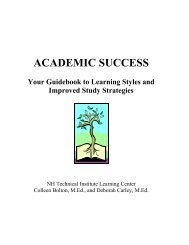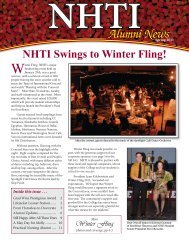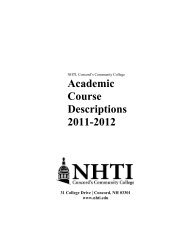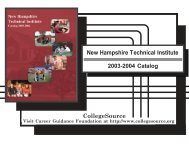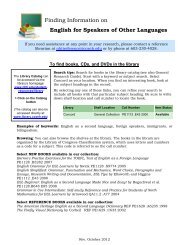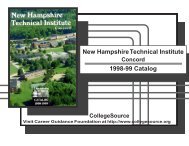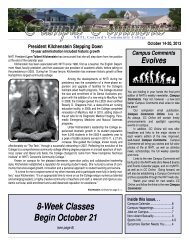Catalog 05-06 - NHTI - Concord's Community College
Catalog 05-06 - NHTI - Concord's Community College
Catalog 05-06 - NHTI - Concord's Community College
- No tags were found...
Create successful ePaper yourself
Turn your PDF publications into a flip-book with our unique Google optimized e-Paper software.
Copyright & Disclaimer Information: Copyright © 1994, 1995, 1996, 1997, 1998, 1999, 2000, 2001, 2002, 2003, 2004, 20<strong>05</strong>, 20<strong>06</strong>, 2007. <strong>College</strong>Source®, Inc. and Career Guidance Foundation. <strong>College</strong>Source® digital catalogs are derivative works owned and copyrighted by <strong>College</strong>Source®, Inc. and Career Guidance Foundation. <strong>Catalog</strong> content is owned and copyrighted by the appropriate school. While <strong>College</strong>Source®, Inc. and Career Guidance Foundation provides information as a service to the public, copyright is retained on all digital catalogs.Copyright & Disclaimer Information: Copyright © 1994, 1995, 1996, 1997, 1998, 1999, 2000, 2001, 2002, 2003, 2004, 20<strong>05</strong>, 20<strong>06</strong>, 2007. <strong>College</strong>Source®, Inc. and Career Guidance Foundation. <strong>College</strong>Source® digital catalogs are derivative works owned and copyrighted by <strong>College</strong>Source®, Inc. and Career Guidance Foundation. <strong>Catalog</strong> content is owned and copyrighted by the appropriate school. While <strong>College</strong>Source®, Inc. and Career Guidance Foundation provides information as a service to the public, copyright is retained on all digital catalogs.Course Descriptionscontrol measures of the major groups of microorganisms. This course isspread over two semesters and is intended for students in the Practical Nursingprogram; 5 credits will be earned only upon successful completion of both parts ofthe course. (Prerequisite: high school level biology with lab with a grade of“C” or higher.)BI 111 General Biology I 3-2-4Designed to provide the student with the basic principles of biology,including scientific method, cell structure, cellular biochemistry and energytransformations, and genetics. Laboratories are used to develop skillsin scientific thought and common procedures used in biological experimentation.With BI 112, intended to provide a foundation for furtherstudy in life sciences. (Prerequisites: algebra I; high school level biologyand chemistry, with labs)BI 112 General Biology II 3-2-4A continuation of BI 111. Includes a survey of the taxonomic groupingsof life forms, as well as the principles of evolution and ecology. (Prerequisites:algebra I; high school level biology and chemistry, with labs)BI 115 Introduction to Ecology 3-2-4This course is designed to give non-science majors an opportunity to learnabout the interactions between the physical and biological componentsof the environment. The lecture will provide a broad introduction to theorganismal, population, community and ecosystem levels of ecologicalinteraction. Instructional methods include readings, lecture/discussion,in-class applications, field observations and field research. The lab portionof this course will provide students with practical experience inecological methods and in the design, conduct and analysis of ecologicalstudies. Laboratory exercises are designed to correspond with majorlecture topics. Exercises include laboratory and field studies; studentsshould come prepared to be outside for most labs.BI 120 Human Biology 3-4-4A brief summary of human anatomical structure and physiological systemsdesigned to provide students with the knowledge and perspectivenecessary to work in their chosen fields.BI 122 Basic Pathophysiology 3-0-3A course designed to provide the student with an understanding of thevarious mechanisms by which human diseases develop. Includes a surveyof common disorders involving each of the major body systems. (Prerequisite:BI 120 or permission of department head of Chemistry and BiologicalSciences.)BI 123 The Biology of Human Reproduction 3-0-3This is an introductory course intended to give an appreciation for theimportance of the following areas of reproduction: male and femaleanatomy and development, sexual differentiation, puberty, menstruation,parturition, lactation, assisted reproductive technologies, birth controlmethods, and menopause. (Recommended: high school level (or higher)biology)BI 125 Human Genetics and Society 3-2-4This course is an introduction to genetics for students not majoring in thesciences. The student will be introduced to the basic principles of Mendelianand molecular genetics and will apply these principles to humangenetic traits. Causes and treatments of common inherited diseases willbe discussed as well as genetic technologies and their applications (recombinantDNA technology, genetic engineering, in vitro fertilization). Theassociated ethical and social issues will also be examined. Lab componentto complement lecture. (Recommended: high school level (or higher)biology)BI 159 Personal Nutrition 3-2-4An introductory course including laboratory for the individual interestedin nutrition as a tool for personal health promotion and disease prevention.Incorporates basic principles of nutrition with discussions of contemporaryissues. Laboratory exercises allow for exploration of lecturetopics and will include scientific method, food analysis, diet analysis andnutritional lifestyle analysis.BI 195 Anatomy and Physiology I 3-2-4An introduction to the structure and function of the human body. Includeselementary cytophysiology, histology, and anatomy and physiologyof the integumentary system, skeletal system, muscular system, nervoussystem, and special senses. Laboratory work parallels lecture topics, andincludes microscopy, study of human anatomical models, dissection ofpreserved animals, and physiological experimentation. (Prerequisite: highschool biology with lab and high school chemistry with lab, each with agrade of “C”or higher, or permission of the Department Head of Chemistryand Biological Sciences)BI 196 Anatomy and Physiology II 3-2-4A continuation of BI 195. Includes anatomy and physiology of the endocrinesystem, circulatory system, immune system, respiratory system, digestivesystem, excretory system, and reproductive system. Other topicscovered include nutrition and metabolism, acid/base balance, fluid andelectrolyte balance, and genetics. Laboratory work parallels lecture topics,and include microscopy, study of human anatomical models, dissectionof preserved animals, and physiological experimentation. (Prerequisite:BI 195 or permission of department head of Chemistry and BiologicalSciences)BI 202 Microbiology 3-3-4Lectures focus on three major areas: 1) basic concepts of microbiology,including morphology and physiology of prokaryotes, eukaryotes, andviruses; 2) host resistance to disease and immunology; and 3) epidemiologyof selected diseases caused by bacteria, viruses, fungi, protozoa, andparasitic worms. Labs also focus on three major areas: 1) basic skills suchas staining, microscopy, and isolation techniques; 2) bacterial physiologyas is pertinent to identification of bacterial species; and 3) control ofmicroorganisms via chemotherapeutic agents, physical means and chemicaldisinfectants. (Prerequisite: BI 196)BI 211 Genetics 3-2-4A lab course intended to enhance a student’s knowledge of basic geneticsand to provide the foundation necessary for further studies in molecularbiology, cell biology, evolution, systematics, and behavior. Topics coveredwill include Mendelian genetics, molecular genetics, immunogenics,genetics of cancer and population genetics. (Prerequisites: BI 111, or BI195, or BI 202, and MT 123 or equivalent; or permission of departmenthead of Chemistry & Biological Sciences)BI 212 Ecology 3-2-4Investigations into the biological and physical factors affecting the distribution,abundance, and adaptations of organisms. Interrelationships atthe population, community, and ecosystem levels will be studied. (Prerequisites:BI 111, BI 112 and MT 123; MT 251 recommended; orpermission of department head of Chemistry and Biological Sciences)BI 222 Pathophysiology 3-0-3A course that provides the allied health student with an understanding ofdisease processes by building on the student’s knowledge of normalanatomy and physiology. Common disorders of major body systems arediscussed relative to the mechanisms by which they develop and theireffects on homeostasis. (Prerequisite: BI 196 or permission of departmenthead of Chemistry and Biological Sciences)BI 259 Normal and Therapeutic Nutrition 4-0-4An introductory course in normal and therapeutic nutrition designed forstudents in allied health programs. Focuses on the application of basicprinciples of nutrition to health promotion and disease prevention, aswell as the role of nutritional intervention as a therapeutic tool in specificpathologies. Includes discussion of contemporary issues in nutrition. (Prerequisites:BI 159 or BI 196, or permission of department head ofChemistry and Biological Sciences.)88



